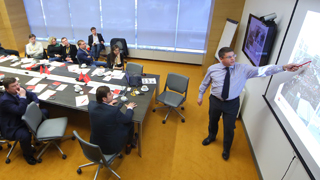
Social dialog
Social dialog kan definieras som förhandlingar, samråd, gemensamma åtgärder, diskussioner och informationsutbyte mellan arbetsgivare och arbetstagare. En väl fungerande social dialog är en viktig förutsättning för att skapa goda arbetsvillkor, och den omfattar många olika aktörer på olika nivåer. Den skapar balans mellan arbetstagarnas och arbetsgivarnas intressen och bidrar till både ekonomisk konkurrenskraft och social sammanhållning.
Den senaste tidens politiska diskussioner på EU-nivå har belyst att det – framför allt sedan krisen 2008 – har växt fram nya diskussioner om social rättvisa, demokrati, arbetets kvalitet och nya modeller för arbetsmarknadsrelationer, som utmanar de traditionella näringslivsrelationerna och systemen för social dialog.
Trettio år efter den historiska invigningen av den europeiska sociala dialogen i Val Duchesse i Bryssel, inledde kommissionen den 5 mars 2015 en process för en nystart för den sociala dialogen vid ett evenemang på hög nivå som samlade representanter från arbetsmarknadens parter från hela Europa. Den europeiska sociala dialogen är ett instrument för EU:s socialpolitik som direkt bidrar till att utforma EU:s arbetslagstiftning och politik.
- Europeiska kommissionens evenemang: En nystart för den sociala dialogen
- Eurofounds bloggartikel: From Val Duchesse to Riga: how to relaunch social dialogue?


























